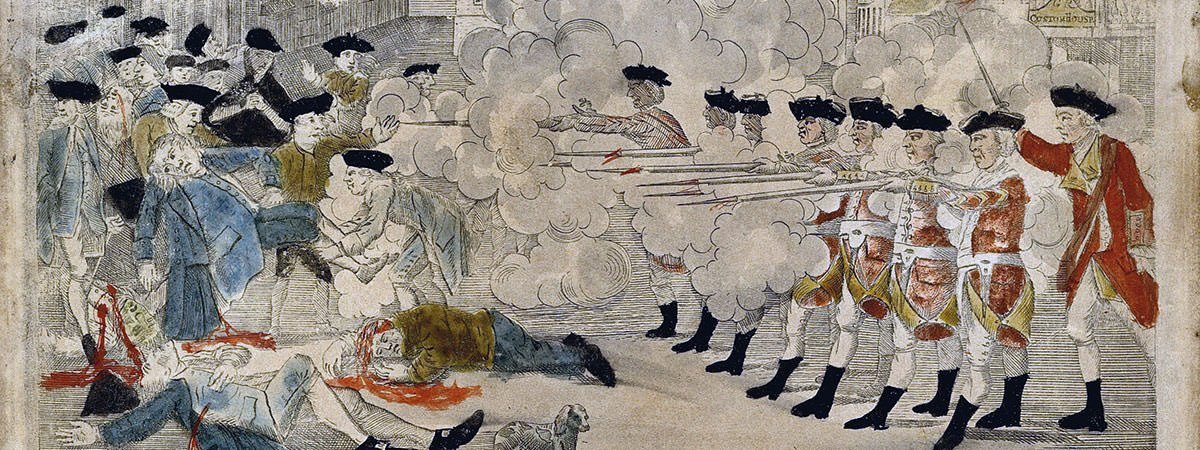The American Revolution was an event in the late 18th century in which the 13 British colonies in North America overthrew British rule to establish the United States of America. The major point of contention that led to the Revolution was whether the British government had the right to enact laws, primarily taxation, which was abiding on its American colonies when there was no representation of the people of the colonies in the British Parliament. The most important events that led to the Revolutionary War include the Stamp Act of 1765, the Townshend Acts, the Boston Massacre, the Boston Tea Party and the Intolerable Acts. Radical thinkers like Thomas Paine and secret organizations like the Sons of Liberty also played an important role in stirring up protests against unfair British legislation and in driving the people to fight for their independence from Great Britain. Here are the 10 major causes of the American Revolution.
#1 Age of Enlightenment
The Age of Enlightenment was an intellectual and philosophical movement that dominated the world of ideas during the 18th century. The Enlightenment writers, such as Thomas Hobbes, John Locke, Jean-Jacques Rousseau and the Baron de Montesquieu, came up with revolutionary concepts like social contract, limited government and the consent of the governed. Other radical notions which came to the forefront during the Age of Enlightenment include the concept that all men are created equal, that the king didn’t have the divine right to rule and that a leader may only govern a society if he had the consent of those he governed. Many people who went on to become the leaders of the American Revolution were well versed with these revolutionary concepts and they fought for their rights based upon these teachings. Moreover, American revolutionary writers spurred the people to fight for their rights. The most prominent among these was Thomas Paine, who wrote Common Sense (1776), the most influential pamphlet of the Revolution. Written in a clear and persuasive tone, it aimed to convince the colonists to demand independence from Britain. Common Sense was read or at least known by nearly every rebel and it is proportionally the all-time best-selling American title.
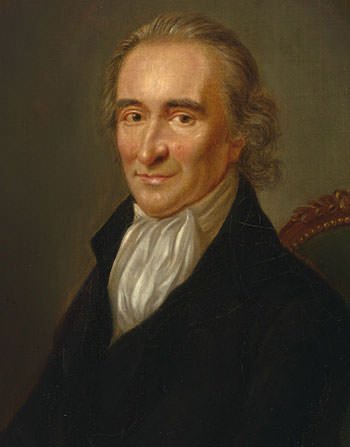
#2 Increased sense of independence among the colonists
To understand the cause of the American Revolution, it is important to understand the nature of the struggle between the British colonies in America and Great Britain. Unlike British colonies in Africa and Asia, there was no notion of racial difference between the Britishers and the white Americans who led the revolt against them. The Americans were not exploited subjects who rose against British oppression, they were instead people who wanted independence from interference of the British government in their matters. In domestic matters, the colonies were largely self-governing albeit the British government could exercise veto over colonial legislation. The colonial legislatures were allowed to levy taxes, muster troops and pass laws. Over time, this gave them a sense of independence from the Crown. Thus, when the British government tried to exercise more control over the colonies, they revolted against such legislation which undermined the freedom and rights they were used to.
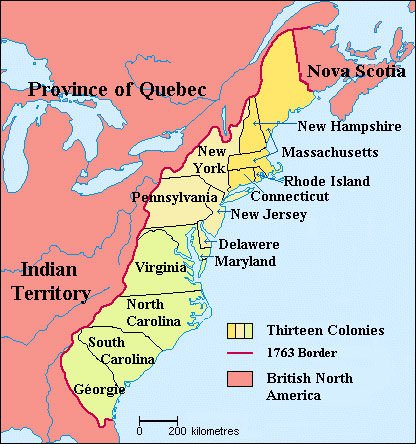
#3 Financial Pressure on Great Britain
Fought between 1756 and 1763, the Seven Years’ War was a conflict between a Britain led coalition and a French led coalition. In America, the French and Indian War happened around the same time pitting the British colonies in America against New France, area colonized by France in America. Prior to this conflict, there was not much friction between Britain and its colonies in America. The colonists in America were protected from foreign invasion by the British military; they paid little taxes and could conduct trade without much interference from the British government. The only major issue were the Navigation Acts, which forbade America to trade directly with foreign nations. Great Britain won the French and Indian War as well as the larger Seven Years’ War. However, this came at a huge cost. The national debt of Britain almost doubled from £74.6 million to £132.6 million. Interests payments on the debt exceeded half of the British Government’s budget. Moreover, Britain decided to place a standing army of 10,000 men in America to oversee its newly acquired territory from France. Britain tried to extract the cost of this standing army as well as lessen its financial burden through new taxation in its Thirteen Colonies in America which led to friction between the two sowing the seeds of the American Revolutionary War.

#4 No Taxation Without Representation
In March 1765, in keeping with the British intent on making Americans share their financial burden, the British Parliament passed the Stamp Act of 1765. This was the first time that Britain had imposed direct taxes on the colonies. The Act required that many printed documents including legal documents, magazines, newspapers and even playing cards, had to be produced on stamped paper made in London, carrying an embossed revenue stamp. The colonists protested to the taxes, not because they were high, but due to the fact that they were being taxed by a British Parliament to which they elected no representatives. This grievance of “no taxation without representation” was one of the focal points of dissent between the colonists and the Britishers. The colonists stated that any laws concerning them that were passed in the British Parliament were illegal under the English Bill of Rights 1689 as they didn’t have any representation in the body. Thus this, according to them, was a denial of their rights as Englishmen, the rights they had previously enjoyed in England. Due to widespread protest of the colonists, the Stamp Act was repealed on March 18, 1766 by King George III after a resolution regarding the same was passed by a vote of 276–168 in the British Parliament.
#5 The Townshend Acts
Though the Stamp Act was repealed, the American Colonies Act 1766, known as the Declaratory Act, came into effect the same day. It declared that British Parliament’s authority in America was same as in Britain and the laws passed by it were binding on the American colonies. Charles Townshend, the Chancellor of the Exchequer in British government, then proposed to implement “external” import taxes instead of internal taxes in America. This led to what are known as the Townshend Acts. These put an indirect tax on various items, including glass, lead, paints, paper and tea, all of which had to be imported from Britain. The Townshend Acts proved equally unpopular and the colonists responded by boycotting all British goods that were subject to taxation and carrying out widespread protests. The British Parliament repealed most of the taxes from the Townshend Acts in March 1770 but the import duty on tea was retained. This was done to demonstrate that the Parliament had the authority to tax the colonies in accordance with the Declaratory Act. The tussle for authority over taxation thus continued steadily worsening the relationship between Britain and its American colonies.
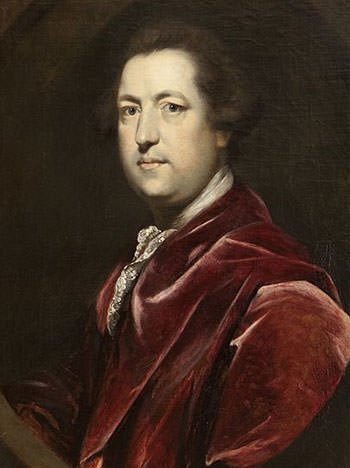
#6 Boston Massacre
On June 10, 1768, in Boston, Massachusetts, British custom officials seized HMS Liberty, a sailing boat, for alleged smuggling. This resulted in a riot due to which the custom officials were forced to flee. This, in turn, led to the 14th and 29th regiments of the British army being stationed at Boston to support crown-appointed officials. The presence of these troops further increased the already rising tensions in Boston. On March 5, 1770, after an altercation with an apprentice of a wig-maker, a British Private Hugh White was surrounded by Bostonians. Seven British soldiers with bayonets then moved through the crowd to rescue White. They became surrounded by a crowd of around 200 Bostonians, who threw snowballs, oyster shells and debris at them; and dared them to shoot. In the confusion, the British soldiers fired at the crowd even though they weren’t ordered to do so. This resulted in 11 people being hit; three died on the spot while two were mortally wounded. This event became known as the Boston Massacre. Six of the eight soldiers were acquitted while the other two were given reduced sentences. The Boston Massacre is regarded as one of the most important causes of the American Revolution as it decisively turned colonial sentiment against King George III and British Parliamentary authority.

#7 Boston Tea Party
On May 10, 1773, the Tea Act was enforced by the British Parliament to aid the financially struggling British East India Company. The Act allowed the Company to sell tea in American colonies without paying taxes except the import duty under the Townshend Acts. More than 80% of the tea consumed in America at the time was smuggled Dutch tea and the Act thus adversely affected American merchants who imported tea from the Dutch. The colonists held demonstrations against the Act and mobilized opposition to delivery of the tea. Ships carrying East India Company tea were sent to Boston, New York, Philadelphia and Charleston. Apart from Boston, the protesters in the other three colonies prevented the tea from being landed. However, Thomas Hutchinson, the Royal Governor in Boston, refused to give in to the pressure. On December 16, 1773, a group of men led by Samuel Adams, some disguised as Native Americans, boarded the East India Company ships and dumped all 342 chests of tea, worth £10,000, into into the Boston Harbor. The event became known as the Boston Tea Party and it was a major incident leading to the American Revolutionary War. It thus became an iconic event of American history.
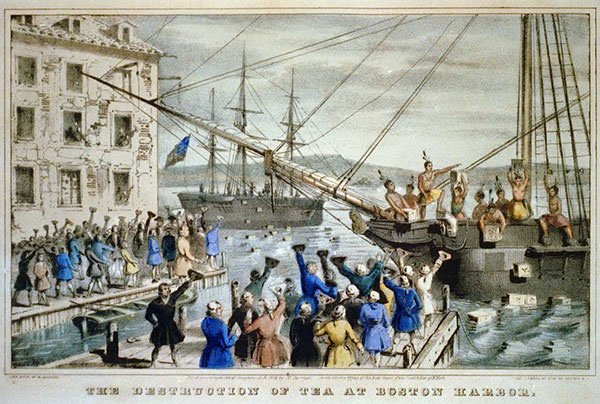
#8 The Intolerable Acts
In response to the Boston Tea Party, the British government enforced four Acts to punish the Massachusetts colonists. These became known as the Intolerable Acts in America. The first was Boston Port Act, which closed the port of Boston until the colonists paid for the destroyed tea. The second was the Massachusetts Government Act, which altered the Massachusetts charter bringing it under the control of the British government and forbade town meetings without approval. The third was the Administration of Justice Act, which allowed royal officials to be tried back in Great Britain if they were accused of crimes committed in Massachusetts. The last and the most controversial Act was the Quartering Act which applied to all colonies. It allowed a governor to house soldiers in unoccupied houses and buildings in towns. Though the colonists were not forced to board troops in their homes as suggested by some, they were to pay for the expense of housing and feeding the soldiers. The colonies saw these Acts as violation of their constitutional rights and perceived them as a threat to the liberties of British America. The Acts thus fueled hatred towards Great Britain and brought the colonies together in support of Massachusetts.
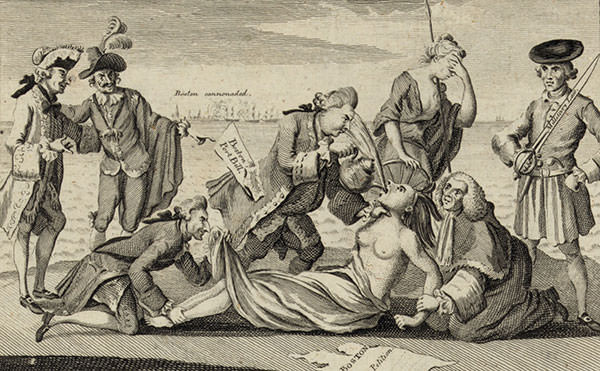
#9 Rejection of the Olive Branch Petition
To respond to the Intolerable Acts, 56 delegates from 12 of the 13 colonies met from September 5 to October 26, 1774 at Carpenters’ Hall in Philadelphia, Pennsylvania. The First Continental Congress was thus formed. After much debate, it decided that the colonies would boycott all British goods beginning on December 1, 1774 unless the Intolerable Acts were repealed by the British parliament. It was further agreed that if their demand was not met, all exports from the colonies to Britain would be stopped after September 10, 1775. The First Continental Congress also sent a petition to King George III outlining the grievances of the colonies to the King and asking for repeal of the Intolerable Acts. The petition to the King indicates that the colonies were still willing to reconcile with Britain. However, it was ignored and instead, in February 1775, Massachusetts was declared in a state of rebellion. On April 19, 1775, the Battles of Lexington and Concord took place initiating the American Revolutionary War. The colonists made one last effort to avoid war with Britain through the Olive Branch Petition, which affirmed American loyalty to Great Britain and beseeched King George III to prevent further conflict. Instead, King George III issued a Proclamation of Rebellion which stated that the colonies were “in rebellion” and the members of Congress were traitors.
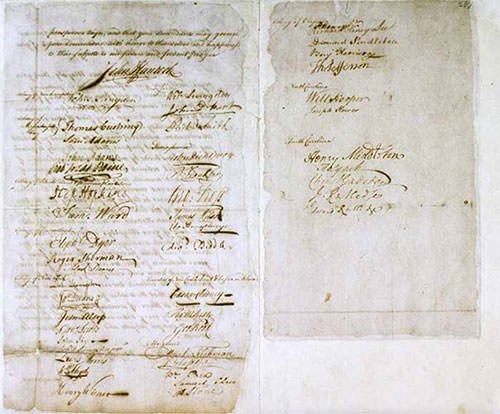
#10 Sons of Liberty
The Sons of Liberty was a secret organization which played a key role in stirring up the people in the colonies to revolt against the Britishers. The group was formed to fight taxation imposed by the British government, primarily the Stamp Act of 1765. Among other things, the group used tactics of fear; force; intimidation; and violence such as tar and feathering. They also stockpiled arms and gun powder. They played a part in the repeal of the Stamp Act in 1766 by organizing protests and through intimidation of British officials. After the Act was repealed, they disbanded as their primary purpose had been achieved. However, the passage of the Townshend Acts two years later led to the revival of the group. The group then carried out their most famous contribution toward the Revolution by orchestrating the Boston Tea Party on December 16, 1773, one of the most significant events that led to the American Revolution. The Sons of Liberty continued to be active until the Revolutionary War ended in 1783. The most famous members of the group include Samuel Adams, Paul Revere, Patrick Henry, John Hancock and Benjamin Rush.

